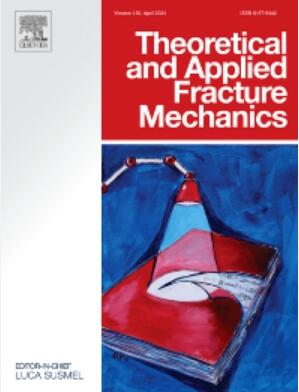Weakly confined slotted cartridge blasting in jointed rock mass
IF 5
2区 工程技术
Q1 ENGINEERING, MECHANICAL
引用次数: 0
Abstract
Directional fracture blasting can improve the smooth blasting effect of layered jointed rock masses. However, few studies have comprehensively considered the interaction between joints and slit blasting, and there is a lack of quantitative research and analysis on slit blasting. Therefore, this study combined slit blasting, pouring model test blocks for explosion testing, and numerical simulations for auxiliary research. Finally, practical engineering applications were conducted. The results showed that the weakly constrained PVC material has a high instantaneous strength under impact and can achieve a good energy accumulation guidance effect. The joint angle has a significant impact on the isolation effect of explosion stress and crack propagation. The isolation effect of the explosion stress gradually weakened with an increase in joint angle. The smaller the angle, the more vulnerable the crack propagation direction is to the “traction” of the joint and tends to the trend of the joint, and the more serious the phenomenon of crack turning, deviation and bifurcation. The results show that the explosion energy propagates preferentially from the cutting seam direction, and the stress in the cutting seam direction reaches the peak value first. The energy in the cutting seam direction has a strong transmission ability and a directional fracture effect on the joints, and the application of weakly restrained slotted pipes in layered rock tunnel blasting construction has a good effect.
在节理岩体中进行弱约束开槽装药爆破
定向裂缝爆破可以改善层状节理岩体的平滑爆破效果。然而,很少有研究全面考虑节理与狭缝爆破之间的相互作用,也缺乏对狭缝爆破的定量研究和分析。因此,本研究结合了狭缝爆破、浇注模型试块进行爆炸试验以及数值模拟进行辅助研究。最后,还进行了实际工程应用。结果表明,弱约束 PVC 材料在冲击下具有较高的瞬时强度,并能达到良好的能量累积引导效果。接头角度对爆炸应力的隔离效果和裂纹扩展有显著影响。随着接缝角度的增大,爆炸应力的隔离效果逐渐减弱。角度越小,裂纹扩展方向越容易受到接头的 "牵引 "而趋向接头的趋势,裂纹转向、偏离和分叉现象越严重。结果表明,爆炸能量优先从切割缝方向传播,切割缝方向的应力首先达到峰值。切缝方向的能量具有较强的传递能力,对接头具有定向断裂作用,弱约束槽管在层岩隧道爆破施工中的应用效果较好。
本文章由计算机程序翻译,如有差异,请以英文原文为准。
求助全文
约1分钟内获得全文
求助全文
来源期刊

Theoretical and Applied Fracture Mechanics
工程技术-工程:机械
CiteScore
8.40
自引率
18.90%
发文量
435
审稿时长
37 days
期刊介绍:
Theoretical and Applied Fracture Mechanics'' aims & scopes have been re-designed to cover both the theoretical, applied, and numerical aspects associated with those cracking related phenomena taking place, at a micro-, meso-, and macroscopic level, in materials/components/structures of any kind.
The journal aims to cover the cracking/mechanical behaviour of materials/components/structures in those situations involving both time-independent and time-dependent system of external forces/moments (such as, for instance, quasi-static, impulsive, impact, blasting, creep, contact, and fatigue loading). Since, under the above circumstances, the mechanical behaviour of cracked materials/components/structures is also affected by the environmental conditions, the journal would consider also those theoretical/experimental research works investigating the effect of external variables such as, for instance, the effect of corrosive environments as well as of high/low-temperature.
 求助内容:
求助内容: 应助结果提醒方式:
应助结果提醒方式:


